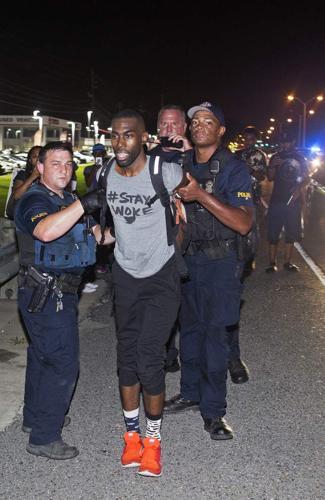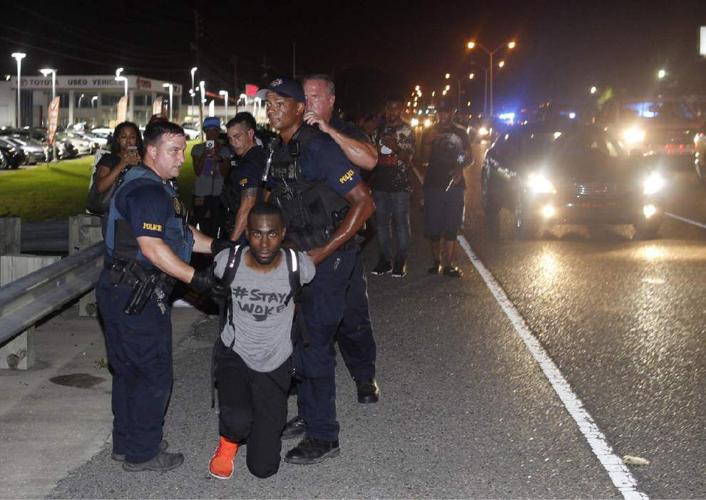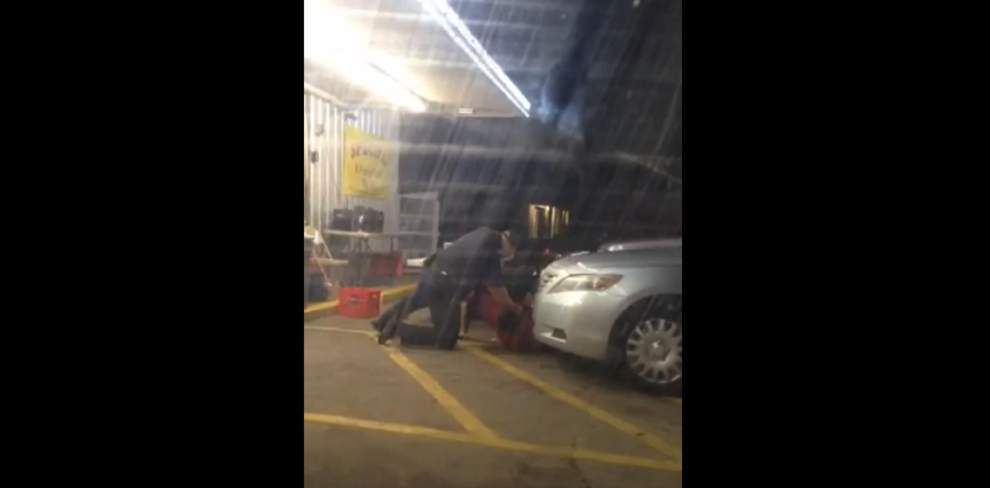An attorney for a prominent Black Lives Matter activist urged a federal judge Monday to dismiss a lawsuit by an unnamed Baton Rouge police officer who claims he was injured during a protest four days after the deadly police shooting of Alton Sterling in the city.
A lawyer for the officer, however, asked Chief U.S. District Judge Brian Jackson to allow the suit to move forward and for the officer who filed it to remain anonymous for health and safety reasons.
Jackson took the arguments under advisement and said he would issue a ruling in the coming days. The officer sat with his attorneys during the hearing.
Billy Gibbens, who represents DeRay Mckesson, of Baltimore, argued the suit against Mckesson should be thrown out because it makes only unsupported, speculative allegations.
Donna Grodner, one of the officer's attorneys, acknowledged in court that it is not known who threw a piece of concrete at the officer, causing him to lose teeth and suffer other injuries during the July 9 protest outside Baton Rouge Police Department headquarters at the intersection of Airline Highway and Goodwood Boulevard.
A Baton Rouge police officer who lost teeth and suffered other injuries during a protest out…
The suit, filed in November, alleges Mckesson came to Baton Rouge in July "for the purpose" of "rioting to incite others to violence against police and other law enforcement officers."
The suit also claims Mckesson organized the protest, was in charge of it, gave orders throughout the day and night, and that the unknown person who injured the officer was "under the control and custody" of Mckesson.
"I'm very sorry that happened," Gibbens said of the officer's injuries. "I think they're suing the wrong person."
Grodner argued the protest "turned into a riot" because of Mckesson's actions.
"They were begging for the police to come out and confront them," she said of the protesters.
Grodner also argued the officer should remain anonymous during the legal proceedings for the health and safety of himself and his family, but Gibbens told the judge such anonymity would prejudice Mckesson.
"Mr. Mckesson will be unfairly viewed as a threat," he said.
Grodner conceded to Jackson that there is no current, credible threat of violence against the officer.
Gibbens added there is no justification for allowing the officer to sue Mckesson -- and Black Lives Matter -- anonymously.
"We absolutely, 100 percent believe there is no risk from my client," said Gibbens, who only represents Mckesson in the suit.
Alton Sterling, a 37-year-old black man, was shot and killed July 5 by a Baton Rouge police officer during a confrontation with officers outside the Triple S Food Mart on North Foster Drive.
Two days later in Dallas, five officers were killed and seven were seriously injured by a sniper during a Black Lives Matter protest, and back in Baton Rouge on July 17, a former U.S. Marine from Kansas City, Missouri, shot and killed a sheriff's deputy and two police officers in an ambush and wounded three other officers.
Grodner alleged that a "pattern of some pretty violent activity" has followed Black Lives Matter protests.
Jackson noted that the city of Baton Rouge had to deal with "tragic deaths" last summer.
At least three lawsuits have been filed in Baton Rouge since Sterling's death accusing police of violating protesters' civil rights. The most recent was filed last week and alleges the arrests of protesters show a pattern of "racist law enforcement" in the city.
Law enforcement officials in Louisiana's capital face another federal lawsuit accusing them …
Police arrested nearly 200 protesters following Sterling's death. The East Baton Rouge Parish District Attorney's Office chose not to prosecute roughly 100 protesters who were arrested only on charges of obstructing a highway.
The city and other defendants already have agreed to a settlement with attorneys for those protesters, including Mckesson, only arrested for obstructing a highway. The deal calls for $500 cash payments to up to 90 protesters.
The president of the union representing Baton Rouge police officers is lambasting Metro Coun…
The union representing Baton Rouge police officers has called the settlement agreement a "slap in the face" to officers.









